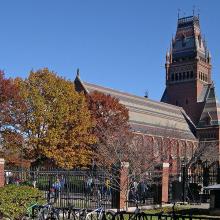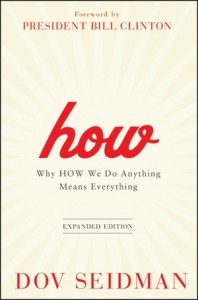Values
Forget Wall Street. Today's "best and brightest" are heading to California's Silicon Valley and New York's Silicon Alley, and to a few other tech-startup hot spots.
Thousands of aspiring engineers, web developers, designers and marketers live in dormitories, work in open-floor bullpens, attend coding competitions to enhance their skills, and work hours that defy body chemistry. It sounds like fun.
Some work on projects that make a positive contribution to society; some are coding games, entertainment apps, and schemes to monetize friendships.
They take stock for pay and wait for the magic letters "IPO" to appear. Meanwhile, their employers fight for their loyalty with free food and party-on office cultures.
The brass ring they chase looks like Marissa Mayer, the 37-year-old former Google star who was tapped to lead Yahoo out of its extended doldrums. Like any public person, Mayer is painted in stark colors: as both immensely talented and merely lucky, an inspiring leader and a rude monster, likely to succeed and sure to fail.
There is something fundamentally wrong with our education system when the draws of a huge salary and big bonuses consistently trump the aspirations and dreams that were front and center in our lives just four years earlier. Debts, a lack of job opportunities in other fields, your basic standard-issue panic — or maybe a simple absence of imagination can take hold and send us running into the arms of the recruiter with the flashy suit, a Hollywood smile and promise of a better life.
As Terkel reminds us: “Young people will continue to go work in the financial sector as long as its pay is disproportionately higher than alternative careers. It's basic human nature: Follow the money.”
But what would it look like if we didn’t follow the money? What if Wall Street paid no more than schools or hospitals?
What would our economy look like if these leading young minds chose not to work for big banks and consultants, but instead were the teachers that helped turn failing schools around, the innovators and engineers who were designing products that would create thousands of new jobs?
What needs to be done so that the finest members of the 2012 graduating class head to Main Street instead of Wall Street?
The Norton commercial says explicitly what most advertisements only imply.
You are the things you own.
Your identity is the stuff you have.
Your worth is what you own.
One year of prison costs more than one year at Princeton. Capitalism and social justice. OpEd: The values discussion we're not having. 'One Day's Wages' fights poverty two years on. Government aid helped cut U.S. poverty nearly in half. Religion-friendly democracy and democracy-friendly religion. And Newt Gingrich says God forgave him.
On Sunday morning (11/6), Sojourners CEO Jim Wallis appeared on CNN's "State of the Union," with American Values president Gary Bauer and host Candy Crowley to discuss how religion will affect the 2012 General Election.
On the blog, view video of Jim's appearance, in two parts.
Part 1:
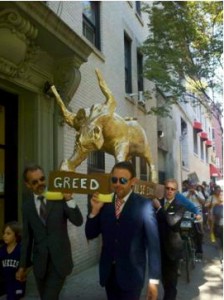 Editor’s Note: In light of the recent protests at #OccupyWallStreet and around the world, we have revisited Jim Wallis’ 2010 book Rediscovering Values: On Wall Street, Main Street, and Your Street and picked out some passages that are particularly pertinent to what we are seeing in our nation today.
Editor’s Note: In light of the recent protests at #OccupyWallStreet and around the world, we have revisited Jim Wallis’ 2010 book Rediscovering Values: On Wall Street, Main Street, and Your Street and picked out some passages that are particularly pertinent to what we are seeing in our nation today.
The Passover of the Jews was near, and Jesus went up to Jerusalem. In the temple he found people selling cattle, sheep, and doves, and the money changers seated at their tables. Making a whip of cords, he drove all of them out of the temple, both the sheep and the cattle. He also poured out the coins of the money changers and overturned their tables. He told those who were selling the doves, “Take these things out of here! Stop making my Father’s house a marketplace!” His disciples remembered that it was written, “Zeal for your house will consume me.”
– John 2:13-17
Interestingly, in his turning over of tables, Jesus specifically targeted the merchants who were selling doves. Doves were the least expensive sacrifice permitted to be offered in the temple, and, therefore, were often bought by the poorest of the pilgrims.
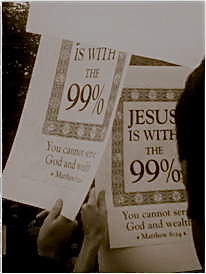
[When Jesus turns over the tables] we see a man enraged at injustice and passionately confronting those who exploit the poor. We also learn that there are some things that we all should get angry about, that there are situations where the only appropriate response is confrontation…
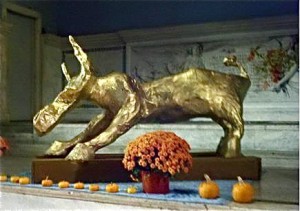 First, we were sold a lie. We were sold an illusion that promised the American Dream was as close as our next purchase. That we could pursue our selfish interests without thought to the consequences, because the “invisible hand” would work it all out in the end. We were told that we did not need to work for wealth, that it would come if only we put our money in the hands of the right stock broker, mutual fund, or stock…
First, we were sold a lie. We were sold an illusion that promised the American Dream was as close as our next purchase. That we could pursue our selfish interests without thought to the consequences, because the “invisible hand” would work it all out in the end. We were told that we did not need to work for wealth, that it would come if only we put our money in the hands of the right stock broker, mutual fund, or stock…
Second, the rules of the game failed. It was supposed to be simple. Work hard, get ahead, buy a home, and tuck some money away for the future in a 401(k). If you followed those rules, everything would work in your favor. But good jobs have disappeared, wages have been garnished, and 401(k) savings have disappeared. The rules of the game seem to have worked for those who set the rules, but not for those who played by them.
Third, our good was supposed to trickle down. We were promised that as the rich got richer, the rest of the country would prosper as well. If we handed our finances and ultimately our lives over to those who knew the market the best, it would benefit us all. If we took the virtues of the market and made them the virtues of our lives, we, too, would experience boundless prosperity. Fulfillment would come if we could just trust the market enough to work for us…
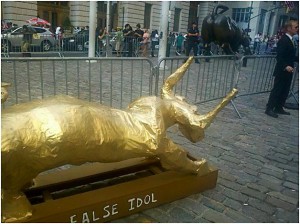 The market has become our “golden calf,” our idol of ultimate allegiance… This is when God—and then Moses—got angry. Why? Just because they built a golden calf? No. The calf could have been just a work of art, a statue to enjoy. What made the calf an idol was that the people gave the newly created calf the credit for leading them out of Egypt. They gave to the golden calf credit and attributes that belong only to God…
The market has become our “golden calf,” our idol of ultimate allegiance… This is when God—and then Moses—got angry. Why? Just because they built a golden calf? No. The calf could have been just a work of art, a statue to enjoy. What made the calf an idol was that the people gave the newly created calf the credit for leading them out of Egypt. They gave to the golden calf credit and attributes that belong only to God…
Today, instead of statues, we have hedge funds, mortgage- backed securities, 401(k)s, and mutual funds. We place blind faith in the hope that the stock indexes will just keep rising and real estate prices keep climbing. Market mechanisms were supposed to distribute risk so well that those who were reckless would never see the consequences of their actions. Trust, security, and hope in the future were all as close to us as the nearest financial planner’s office. Life and the world around us could all be explained with just the right market lens. These idols were supposed to make us happy and secure and provide for all our needs. Those who manage them became the leaders to whom we looked, not just for financial leadership, but direction for our entire lives. That is idolatry.
Rich and poor alike were sucked into making heroes out of those who seemed to be able to turn everything they touched into gold. Holocaust survivor and Nobel Peace Prize recipient Elie Wiesel lost virtually all of his personal wealth and his foundation’s, up to $37 million, to Bernie Madoffs Ponzi scheme. “We gave him everything, we thought he was God, we trusted everything in his hands.”‘
(All pictures are courtesy of Catholics United, who produced the ‘golden calf’. Extracts come from pages 19-29 of the hardcover edition of Rediscovering Values.)
You have awakened the sleeping giant, too long dormant, but ever present, deep in the American democratic spirit. You have given voice and space to the unspoken feelings of countless others about something that has gone terribly wrong in our society. And you have sparked a flame from the embers of both frustration and hope that have been building, steadily, in the hearts of so many of us for quite some time.
Throughout history, often it has been left to the youth of a society to do that, and you boldly have stepped into the role of the emerging generation, which sometimes means saying and doing what others only think. You have articulated, loudly and clearly, the internal monologue of a nation.
Visit msnbc.com for breaking news, world news, and news about the economy
Where is the compassion in our economy and our politics? It says much of the economic system that Sojourners even needs to campaign for a "moral budget." How do we, as Christians, challenge structures that allow billions of dollars to be wasted via tax loopholes while 1 in 6 Americans live in poverty?
Will we, as Sachs hopes,
Being a socialentrepreneur used to be a lonely endeavor. I grew up believing that to be in business meant leaving your soul at the front door -- being ruthless, shrewd, and above all focused on profitability at any cost. But as a businessman, I found myself less interested in the bottom line of profit than in the bottom line of community impact. For example, I started Busboys and Poets as a restaurant and gathering place, but also a social enterprise -- a business with a conscience -- in Washington, D.C.'s U Street neighborhood.
Having grown up in D.C., I was amazed at the dramatic changes that swept various neighborhoods in the 1990s. The U Street corridor in particular was undergoing some of the most vivid transformation.
Today, "Values and Capitalism," a project of the American Enterprise Institute, sponsored a full-page ad in Politico (see page 13) in response to the Circle of Protection. While it is encouraging to see another full-page ad urging our nation's legislators to be concerned about the poor, it is unfortunate that the critique of the Circle of Protection and Sojourners work is based on an error.
He put before them another parable: "The kingdom of heaven is like a mustard seed that someone took and sowed in his field; it is the smallest of all the seeds, but when it has grown it is the greatest of shrubs and becomes a tree, so that the birds of the air come and make nests in its branches." He told them another parable: "The kingdom of heaven is like yeast that a woman took and mixed in with three measures of flour until all of it was leavened."
The kingdom of heaven is like treasure hidden in a field, which someone found and hid; then in his joy he goes and sells all that he has and buys that field. Again, the kingdom of heaven is like a merchant in search of fine pearls; on finding one pearl of great value, he went and sold all that he had and bought it.
--Excerpts from Matthew 13
It's been a rough weekend. Watching the devastation that the combination of mental illness and fundamentalism brought to the people of Norway. Watching what the combination of drug addiction and fame brought to a talented singer, who, like so many who went before her, is now dead at the age of 27. Something they don't tell you when you get clean and sober is that if, by the grace of God, you manage to stay that way -- you get a much better life -- but year after year you also watch people you love die of the same disease. So yesterday when I heard that Amy Winehouse had been found dead in her home, it brought me back to nine years ago when my dear friend PJ was also found dead in his home.
Today is another intense day of politics at the White House. The debt default deadline is fast approaching. The stakes for the nation are high as politicians can't agree on how to resolve the ideological impasse on how to reduce the deficit before the nation defaults on its financial obligations.
Yesterday, before Congressional leaders were due at the White House for critical negotiations, I, along with 11 other national faith leaders, met with President Obama and senior White House staff for 40 minutes. We were representing the Circle of Protection, which formed in a commitment to defend the poor in the budget debates. Sitting in the Roosevelt Room of the White House, we opened in prayer, grasping hands across the table, and read scripture together. We reminded ourselves that people of faith must evaluate big decisions on issues like a budget by how they impact the most vulnerable.
We are looking for 1,000 pastors to debunk a myth based on the political assertion that government doesn't have any responsibility to poor people. The myth is that churches and charities alone could take care of the problems of poverty -- especially if we slashed people's taxes. Both this assertion and myth contradict the biblical imperative to hold societies and rulers responsible for how they treat the poor, and ignore the Christian tradition of holding governments accountable to those in need. Faith-based organizations and government have had effective and healthy partnerships, and ultimately, the assertion and myth have more to do with libertarian political ideology, than good theology.
On Easter weekend, I will break my fast. I will have spent almost four weeks drinking only liquids. But, as is often true of fasts, what has been gained is far greater than anything given up.
[Editors' note: During the season of Lent we will be posting excerpts from the Rediscovering Values Lenten Study Guide. We invite you to study God's word with us through these posts.]
[Editors' note: During the season of Lent we will be posting excerpts from the Rediscovering Values Lenten Study Guide. We invite you to study God's word with us through these posts.]
The hunger fast for a moral budget has gone spiritually viral. Ten days ago, we announced at the National Press Club that the budget debate had become a moral crisis.
Yesterday morning, Tony Hall, David Beckmann, Ritu Sharma, and I began a water fast because of what I call "selectively cruel" budget
The U.S. just started another war. We're good at starting wars. We're not good at ending them, but we start them really well. They say this is for "humanitarian" reasons. Aren't they all?

